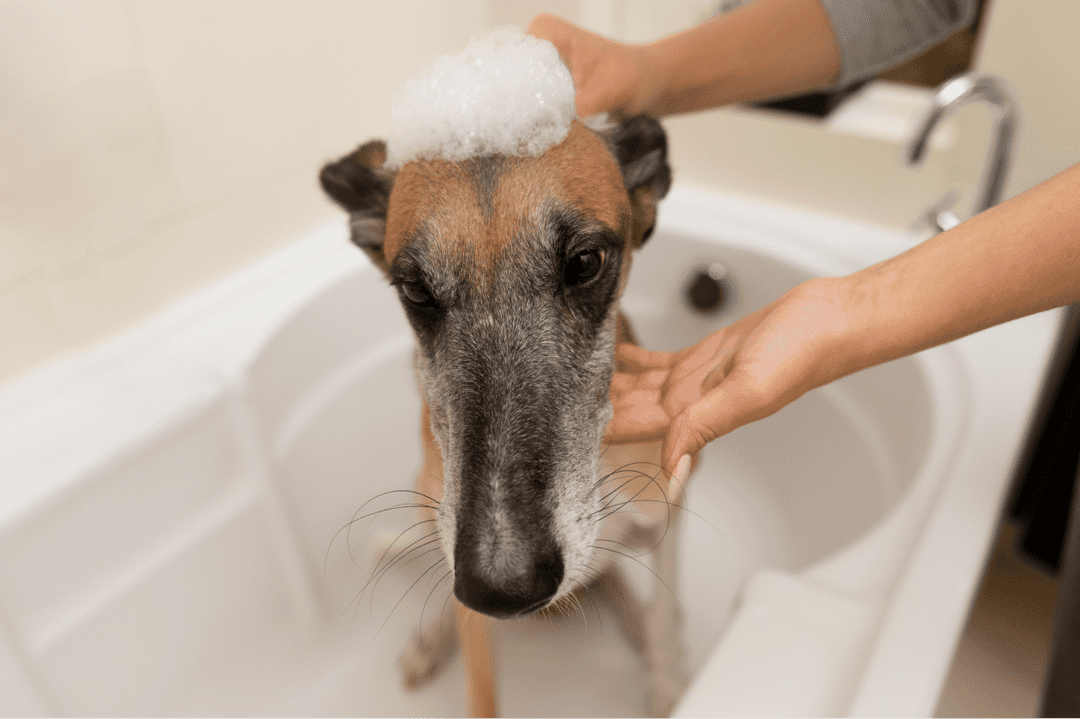
Health & Wellness
Understanding Canine Skin Conditions: Causes and Treatments
• 3 min read
When dogs incessantly scratch or lick their skin, it might indicate an underlying skin condition that requires attention. Identifying the symptoms and types of canine skin diseases can guide pet owners in seeking appropriate care.
Here’s a detailed overview of common symptoms and a breakdown of six prevalent skin conditions in dogs, along with their causes and potential solutions.
Symptoms of Canine Skin Conditions
Dogs with skin conditions may exhibit various symptoms, including itchiness, eczema, and flaking. These symptoms can escalate to wounds, infections, and secondary complications, making prompt and accurate diagnosis crucial.
Visiting a veterinarian to determine the cause and appropriate treatment is essential for managing and resolving skin issues.
Common signs include:
Itchiness (scratching, licking, biting)
Flaking
Scabs
Skin rashes (hives)
Eczema
Red bumps
Hair loss

Six Common Canine Skin Conditions
Ringworm (Dermatophytosis)
Ringworm is a fungal infection caused by dermatophytes, characterized by circular, red inflammations on the skin. It primarily affects areas around the head, ears, and paws, causing severe itchiness.
Highly contagious, it can also spread to humans, necessitating disinfection of belongings and careful handling of infected pets.
Yeast Infection
Yeast infections are common and caused by fungi such as Malassezia or Candida. While yeast naturally resides on canine skin, overgrowth due to compromised immunity can lead to infections, particularly in warm body areas. Symptoms include itchiness, thickened skin, odor, scaling, and eczema.
Hormonal Skin Disorders
Persistent skin conditions unresponsive to treatment may stem from hormonal disorders, including Cushing's syndrome (hyperadrenocorticism) and hypothyroidism. Cushing’s syndrome manifests as symmetric hair loss, thin skin, increased thirst and urination, and a protruding abdomen.
Hypothyroidism can cause skin darkening, hair loss, ear infections, brittle fur, weight gain (without increased appetite), reduced activity, and sensitivity to cold.
Lupus
Lupus, an autoimmune skin disease, presents in two forms: Discoid Lupus Erythematosus (DLE) and Systemic Lupus Erythematosus (SLE). DLE primarily affects facial areas, causing skin inflammation, scabs, and scaling, often exacerbated by sunlight and warm weather.
SLE involves more severe symptoms affecting joints, liver, heart, and skin, leading to inflammation, joint swelling, and liver enlargement.
Atopy (Allergies)
Allergies to pollen, dust, or food can cause dermatological reactions termed atopy. Symptoms include severe itchiness, resulting in scratching, licking, flaking, and hair loss. Identifying and managing the allergen source is crucial for treating atopic dermatitis.
Pyoderma (Impetigo)
Pyoderma, a bacterial infection often caused by Staphylococcus, leads to pus-filled skin conditions. While primarily bacterial, fungi, allergies, parasites, or hormonal issues can also trigger it. Symptoms include red, acne-like inflammation, pus, scabs, and sometimes blisters. Warm, humid conditions and frequent bathing can exacerbate pyoderma, especially during summer.

Caution with Medicinal Shampoos
When managing canine skin conditions, medicinal shampoos can be beneficial. However, choosing the correct shampoo based on the specific condition is critical. Antibacterial shampoos are recommended for bacterial dermatitis, while antifungal shampoos are suited for fungal infections.
It’s essential not to overuse medicinal shampoos due to their potential irritancy. Consulting with a veterinarian to determine the appropriate product and usage frequency is advisable.
In conclusion, while many skin conditions in dogs can be concerning, understanding the symptoms, causes, and treatment options can empower pet owners to seek the right care.
If your dog's itchiness persists despite home remedies, professional veterinary advice is crucial to address the issue effectively and ensure your pet’s health and comfort.
MMDC Team
Healthy Pet, Happy Pawrents 💛